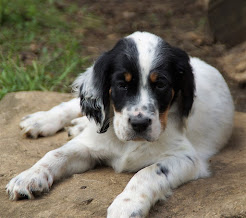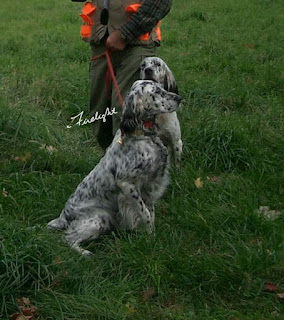By Randy Lawrence
Painful admission: I have been a sexist pig for most of my gun dog life. I have traditionally owned, hunted, lived with (for) female English setters.
But when I hear bloviating self-appointed experts drone on about females being “more predacious” or males being “more focused in training” or females being "sweeter" or more "cooperative" or males being forever marking things and spoiling for a brawl, I'm the first to call "Meadow Muffins." Most of those sorts of notions stem from folktales, casual-at-best dog handlers, and weird anthropomorphic stereotypes. I simply liked a good dog; several of my best just happened to be females.
Still, I get it. Unlike other loathsome stereotypes, there are admitted biological considerations in bird dog girl/boy biases, especially with intact females who will absolutely come into heat on their schedule, not on the Division of Wildlife’s calendar of seasons. And yes, males require monitoring and managing regarding manners and jostling for pecking order (though anyone who has broken up a fight between females, four-legged or two, might agree that breaking up a male fracas is much less perilous).But in general, I believe issues of “maleness” in bird dogs are really handler issues. In a short online piece entitled "Dog or Bitch - What Makes the Best Gundog," the trainer of Great Britain's Fenway Labradors, Jeremy Hunt, writes "(A) well-trained dog is aware that he has to contain his amorous intentions in just the same way that he has had to master other parts of his training as a civilized male. For some owners that degree of control is not always achieved in their dogs and can be a lifetime nuisance."
In other words, most, if not all, of that Billy Bad Boy marking and humping and macho posturing is a handler problem, not a "comes with the testicles" inevitability.
I am almost embarrassed to admit that there was a time when my bias toward females was rooted in that I saw a great working female setter or pointer as a sustainable enterprise, one that would keep friends and me in class gun dogs into perpetuity, whilst generating a little sump'n-sump'n for the coffers. Ask any serious gun dog aficionado who's at least on his or her 2nd kennel-and-yard scoop about that, and you will hear hearty guffaws (or at least discreet chuckles).
For most of us amateurs deluded enough to raise two or three litters in a lifetime, that notion of reproducing Her Nibs of Wingbeats or, worse, generating a windfall of shekels-for-puppies seldom works out. When it does, it's more serendipity than science. And once we've outfitted friends, family, and ourselves with that next generation puppy, where's the backyard breeder's market for responsible, well-suited hunting homes?
We live and learn. While we’re at it, let's dispense with the 300-lb gorilla in the corner: the vets and quick-fix (pun gleefully intended) problem solvers whose answer to every behavioral issue even tangentially relative to our dogs' sexuality is drugs and scalpel. That's the subject for its own blog post, but briefly, especially where males are concerned, my own observations come down solidly with the aforementioned Jeremy Hunt at scribehound.com : "...(W)hile vets are now very keen to dismantle male dog parts with great enthusiasm from a young age, the only real advantage I see is that it removes the ability to deliver the goods rather than diffuses (sic) the sexual urge. So while it's never wise to make generalizations, I would say that castration does not always take away the sex-drive and is no auto cure to re-educating a dog that loves to go a 'bitching.'"
From the distaff side of things, spaying can have obvious and legitimate advantages for a working female, though not without certain concerns. Likewise hormonal alteration or behavioral drug administration for either sex makes me more than a little concerned about long term consequences and possible impact on field performance.
So, all things considered, at this point in my life, when I look at a litter, it’s the male puppies I am watching. Sometimes, that’s an advantage in that we are living in a time which, for better or worse, has folks bent on a female, meaning there are often more males available from which to choose.
Beyond that, when folks ask, “Why a male?”, I nod toward the three male English setters and British Labrador who travel, hunt, and live day to day with me and each other with minimal supervision. Better yet, I hold up the example of my friend Flint, the intact Token Dude who amiably lives in a sea of progesterone at the Firelight home office.
Flint is a bird hunter's bird dog. He trained early and naturally. He hunts to the gun with great application and stands his game with intensity. Around the vehicles between hunts and at the hearth at home, Flint is biddable, agreeable, and kindly. Bonded for life to his littermate, Kate, you can usually find him taking his leisure alongside her on one of the dog-dedicated divans scattered around the places where Lynn Dee Galey's pack vie to be wherever she is.
Lynn Dee is not anybody's notion of a "common" dog handler. Flint hit the ground with Firelight brains and temperament, but Lynn Dee schooled "Uncle," Firelight Seth and Flint the same way as she does the females: gender is a fact, not an excuse. There will be order in the House of Firelight, regardless of personal plumbing.
The frat house that is this old farm has hummed right along without fevered longing, misplaced marking, or dopey male posturing (at least from the dogs). But a few months back, we were graced by a self assured, rough and tumble young female named Firelight Spice, a prospect of uncommon precocity (if I do say so myself). Obviously, I am much smitten, as in the old days. But as this brash, dark beauty finds her spot in our hunting and home rotation, Seth, Deacon, Luke, and Finn mind their gentlemanly etiquette and daily remind Spice and me that "guyz got game" too.











